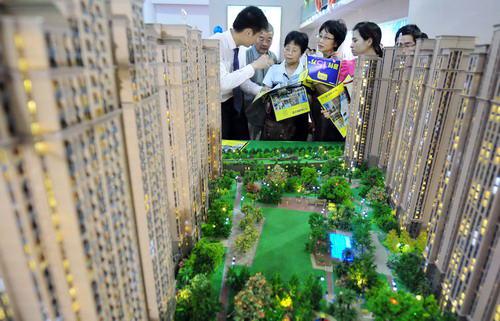Housing prices at 16-month low
Updated: 2012-06-02 09:49
By Wei Tian (China Daily)
|
||||||||
Preferential taxes and low interest rate attract more buyers to market
China's house prices fell to a 16-month low in May as officials pledged to keep property curbs that have sapped demand, according to SouFun Holdings Ltd, owner of the nation's biggest real estate website.
House prices declined 0.3 percent from April to 8,684 yuan ($1,364) per square meter, SouFun said in an e-mailed statement on Friday, based on its survey of 100 cities in the country.
The figure was the lowest since January last year and the ninth month-on-month decline. It is also the longest decline since Soufun started compiling the data in July 2010.
Housing values dropped in 73 cities while 26 posted gains, and one reported no changes in residential prices, SouFun said. Prices in the 10 biggest cities, including Beijing and Shanghai, retreated 0.5 percent from April, and dropped 3.2 percent year-on-year.
|
 People inquire about the price of houses at a fair in Fuzhou, Fujian province, on May 26. China's house prices fell to a 16-month low in May. [Photo/China Daily] |
The Ministry of Housing and Urban-Rural Development said last month China will maintain its curbs on the housing market.
The ministry's statement came after the State Council pledged in April to stick with existing property controls implemented over the past two years, which have tightened restrictions on down payments and mortgages and imposed limits on the number of homes families can buy.
However, as a series of weaker-than-expected economic indicators aroused fears of a faster-than-expected slowdown, some analysts are expecting the authorities will ease controls on the property market, which is still driver of many industries in the world's second-largest economy.
Second- and third-tier cities have already been fine-tuning local rules to stimulate demand, including lowering payment requirements for first-time buyers and offering favorable interest rates.
Property developers in Beijing sold 34.2 percent more new homes in May than in April, according to Bacic & 5i5j Group, Beijing's second-biggest real estate brokerage.
Chen Liang, an analyst with Bacic & 5i5j, said though the curbs remain, preferential taxes and lower interest rate have encouraged more potential home buyers to take the plunge.
He estimated that supply and demand will remain robust in Beijing this month since now is the traditional time for salespersons to boost their performance in the middle of the year.
The central government, while maintaining its housing curbs, has eased rules for lenders. The central bank lowered the amount of cash that banks must set aside as reserves three times since last November to boost liquidity and spur loan growth. The latest move, in May, freed up 400 billion yuan for loans.
"The external economic environment is deteriorating and it is affecting China's property market," said Simon Lo, Hong Kong-based executive director of research for Asia at realtor Colliers International.
"The Chinese government probably realizes this and we're expecting them to slowly relax the curbs in the second half."
However, Zhang Dawei, an analyst with Centaline Beijing, said though an uptick in sales volume may lessen worries about a slump in housing prices, values will remain flat considering the still massive stocks and shrinking investments in the upper stream.
According to the National Bureau of Statistics, investment growth in property development experienced its eighth year-on-year decrease in April. Meanwhile, the real estate confidence index was also at its lowest level in nearly three years.
"Considering the massive construction of affordable housing projects, investments in commercial property have shown an obvious recession already."
Li Yamin, a property market analyst with UBS AG, predicted that the sales volume in May will increase by 20 percent from the previous month.
"The government already has major projects to stimulate the cooling economy, which will delay policy relaxation in the property market. However, if these measures fail to have their desired effect, the chances will increase of easing in the property market," Li said in a research note.
"Meanwhile, a number of people will see their income increasing because of the stimulus policies, and that will create extra demand in the housing market."
Bloomberg contributed to this story
weitian@chinadaily.com.cn

 Relief reaches isolated village
Relief reaches isolated village
 Rainfall poses new threats to quake-hit region
Rainfall poses new threats to quake-hit region
 Funerals begin for Boston bombing victims
Funerals begin for Boston bombing victims
 Quake takeaway from China's Air Force
Quake takeaway from China's Air Force
 Obama celebrates young inventors at science fair
Obama celebrates young inventors at science fair
 Earth Day marked around the world
Earth Day marked around the world
 Volunteer team helping students find sense of normalcy
Volunteer team helping students find sense of normalcy
 Ethnic groups quick to join rescue efforts
Ethnic groups quick to join rescue efforts
Most Viewed
Editor's Picks

|

|

|

|

|

|
Today's Top News
Health new priority for quake zone
Xi meets US top military officer
Japan's boats driven out of Diaoyu
China mulls online shopping legislation
Bird flu death toll rises to 22
Putin appoints new ambassador to China
Japanese ships blocked from Diaoyu Islands
Inspired by Guan, more Chinese pick up golf
US Weekly

|

|






